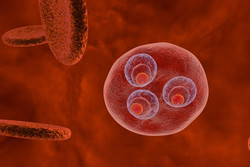PfAlbas – Pro Plasmodium falciparum virulence
P. falciparum has a complex life cycle involving the mosquito vector and the human host with an asexual and reproductive stage. Increasing incidence of pathogen resistance to currently available antimalarial drugs highlights the need for a deeper understanding of its life cycle. The PFALBA (Role of the PfAlbas, a novel DNA and RNA binding protein family, in Plasmodium falciparum chromatin biology and RNA regulation) study investigated the gene regulation process in this parasite. In particular, they focused on the PfAlba family of proteins as previous studies on archaea and other parasites revealed their role in regulating antigenic variation. Antigenic variation is a strategy through which many intracellular pathogens evade detection from the host immune system. A first, researchers demonstrated that PfAlba1 regulates the translation of certain non-cognate mRNAs in P. falciparum asexual stages. Results also indicated that PfAlba2/3 regulates its cell cycle at the RNA level but has no effect on its morphology. Overall, study outcomes suggest that PfAlbas play a critical role in regulating RNA biology during the asexual, intra-erythrocytic developmental cycle of P. falciparum. Even though this project has ended, its researchers are working to identify aptamer sequences that are specifically bound by the PfAlbas to develop antimalarial treatments. Besides advancing the field of cell and molecular biology, project outcomes have significant implications for drug and vaccine development as well as for disease control.







